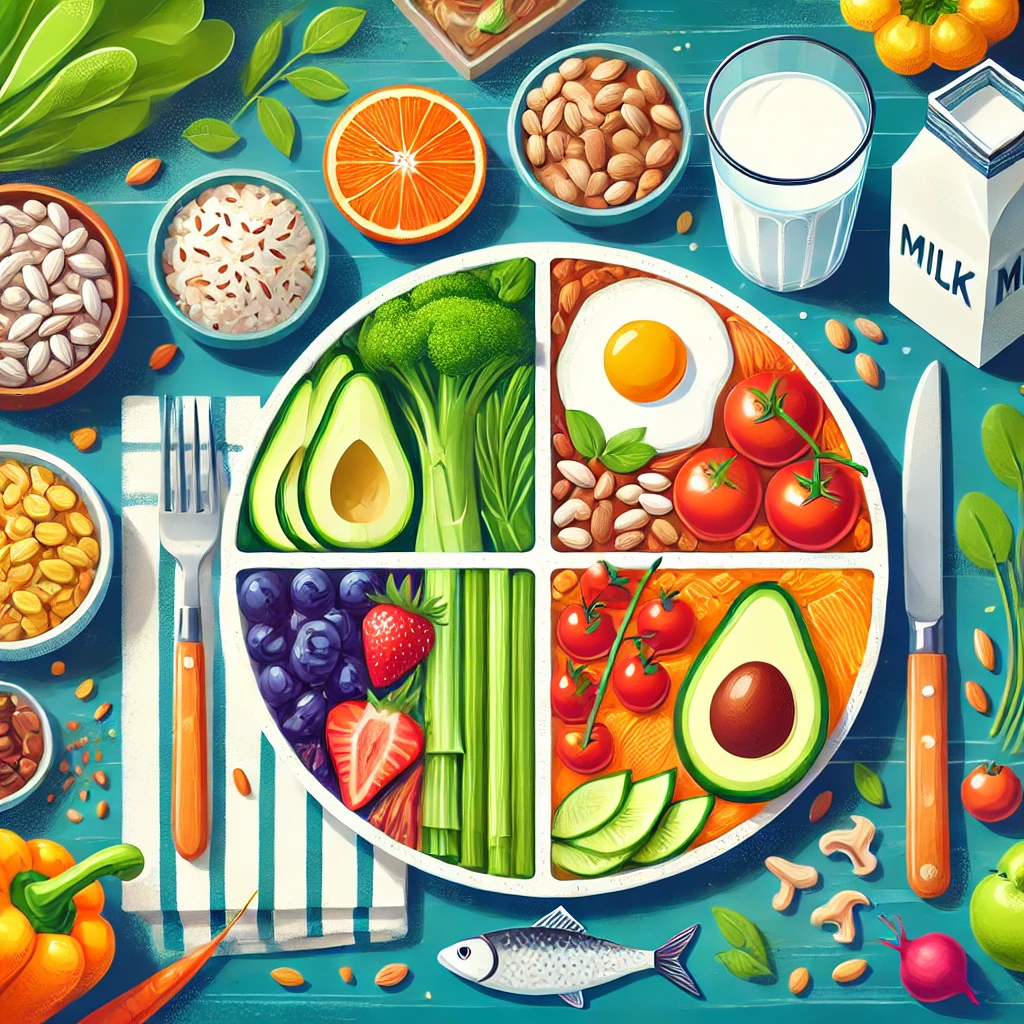
How to Maintain a Balanced Diet for Better Health
Maintaining a balanced diet is the cornerstone of living a healthier, more fulfilling life. What you eat fuels your body and mind, influencing everything from your energy levels to your ability to fight off illness. In today’s fast-paced world, however, maintaining a balanced diet can be challenging. With so many food options and diet trends vying for attention, it’s easy to feel overwhelmed. But by understanding the basics of nutrition and making informed choices, you can take control of your health and enjoy the long-term benefits of a well-rounded diet.
What Is a Balanced Diet?
A balanced diet provides your body with the essential nutrients it needs to function properly. It’s all about eating the right proportions of macronutrients (carbohydrates, proteins, and fats) and micronutrients (vitamins and minerals) to meet your daily energy and nutritional needs.
A balanced diet doesn’t mean eliminating your favorite foods or following strict rules. Instead, it’s about moderation and variety. By incorporating a wide range of whole, nutrient-dense foods, you can enjoy a satisfying diet that supports your health and well-being.
The Benefits of Eating a Balanced Diet
The advantages of maintaining a balanced diet go beyond just physical health. Here are some key benefits:
- Improved Energy Levels: Eating nutrient-rich foods helps your body maintain steady energy throughout the day.
- Weight Management: A balanced diet can help you achieve or maintain a healthy weight by preventing overeating and providing essential nutrients.
- Disease Prevention: Proper nutrition reduces the risk of chronic diseases, including heart disease, diabetes, and certain cancers.
- Better Mental Health: Nutrient-rich foods, particularly those high in omega-3s and antioxidants, can boost mood and cognitive function.
These benefits underscore the importance of making a balanced diet a part of your daily routine.
Components of a Balanced Diet
To build a balanced diet, it’s essential to understand the roles of macronutrients and micronutrients:
1. Macronutrients:
- Carbohydrates: Your body’s main source of energy. Choose complex carbs like whole grains, fruits, and vegetables.
- Proteins: Essential for muscle repair and growth. Include lean meats, fish, eggs, beans, and tofu.
- Fats: Healthy fats, such as those found in nuts, seeds, and avocados, support brain function and hormone production.
2. Micronutrients:
- Vitamins: For example, vitamin C boosts immunity, while vitamin D strengthens bones.
- Minerals: Iron prevents anemia, and calcium supports bone health.
Balancing these nutrients ensures that your body receives everything it needs to thrive.
Practical Tips to Maintain a Balanced Diet
Creating and sticking to a balanced diet doesn’t have to be complicated. Here are some actionable steps:
1. Plan Your Meals
Meal planning helps you control portion sizes and ensures you’re eating a variety of nutrients. Include lean proteins, whole grains, and plenty of colorful fruits and vegetables in every meal.
2. Control Portions
Even healthy foods can lead to weight gain if eaten in excessive quantities. Use smaller plates, eat mindfully, and stop eating when you feel full.
3. Hydrate Regularly
Drink plenty of water throughout the day to support digestion, regulate body temperature, and maintain energy.
4. Snack Wisely
Choose healthy snacks like nuts, yogurt, or fresh fruit instead of processed or sugary options. Snacking can be part of a balanced diet if done mindfully.
5. Cook at Home
Preparing your meals at home allows you to control ingredients and portion sizes. It’s also more cost-effective than eating out frequently.
6. Incorporate Seasonal Foods
Seasonal produce tends to be fresher, more nutritious, and often more affordable. Rotate your fruits and vegetables to keep your diet interesting and diverse.
7. Limit Processed Foods
Highly processed foods are often loaded with sugar, sodium, and unhealthy fats. Stick to whole, natural foods as much as possible.
Foods to Include in a Balanced Diet
Here’s a quick guide to the types of foods you should include in your diet:
- Vegetables: Spinach, broccoli, carrots, and bell peppers are nutrient powerhouses.
- Fruits: Berries, apples, bananas, and citrus fruits provide essential vitamins and antioxidants.
- Whole Grains: Oats, quinoa, brown rice, and whole-grain bread offer complex carbs and fiber.
- Proteins: Chicken, fish, lentils, and eggs are excellent sources of lean protein.
- Healthy Fats: Avocados, nuts, seeds, and olive oil are great options.
FAQs
What is the easiest way to maintain a balanced diet?
Start by planning meals ahead, incorporating a variety of foods, and focusing on moderation. Avoid skipping meals and choose whole, unprocessed foods whenever possible.
How can I balance my diet on a busy schedule?
Meal prepping on weekends, choosing quick but healthy snacks, and keeping nutritious grab-and-go options like fruits or nuts can help you maintain a balanced diet even with a hectic routine.
How do I know if I’m eating too much or too little?
Listen to your body’s hunger and fullness cues. You can also use apps or consult a nutritionist to track your caloric intake and ensure it aligns with your activity level.
What should I drink to stay healthy?
Water should be your go-to beverage. Herbal teas, coconut water, and diluted fresh juices are also healthy options, but avoid sugary drinks.
Is it okay to have cheat meals?
Yes! Occasional indulgences are fine as long as you maintain an overall balanced diet. Moderation is key.
Can a balanced diet improve mental health?
Absolutely. Nutrient-dense foods, particularly those rich in omega-3s, antioxidants, and vitamins, can positively impact mood and cognitive function.
Maintaining a balanced diet is one of the most effective ways to improve your overall health and quality of life. By focusing on variety, moderation, and nutrient-dense foods, you can fuel your body and mind for optimal performance. Remember, it’s not about perfection—it’s about consistency. Start small, make gradual changes, and enjoy the journey to better health, one meal at a time.